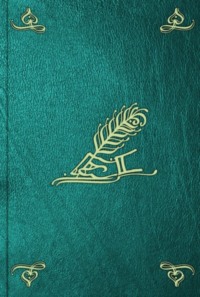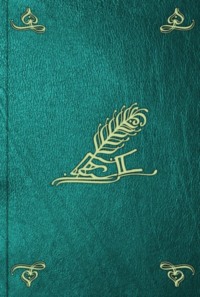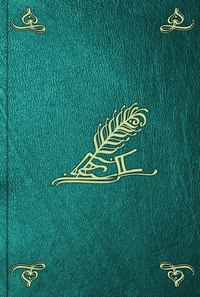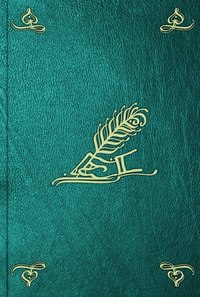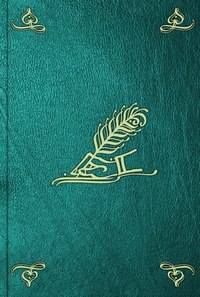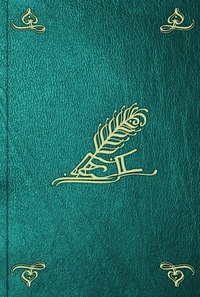 полная версия
полная версияThe Voyage of the Beagle
I could not look on the surrounding plants without admiration. On every side were forests of banana; the fruit of which, though serving for food in various ways, lay in heaps decaying on the ground. In front of us there was an extensive brake of wild sugar-cane; and the stream was shaded by the dark green knotted stem of the Ava, – so famous in former days for its powerful intoxicating effects. I chewed a piece, and found that it had an acrid and unpleasant taste, which would have induced any one at once to have pronounced it poisonous. Thanks to the missionaries, this plant now thrives only in these deep ravines, innocuous to every one. Close by I saw the wild arum, the roots of which, when well baked, are good to eat, and the young leaves better than spinach. There was the wild yam, and a liliaceous plant called Ti, which grows in abundance, and has a soft brown root, in shape and size like a huge log of wood: this served us for dessert, for it is as sweet as treacle, and with a pleasant taste. There were, moreover, several other wild fruits, and useful vegetables. The little stream, besides its cool water, produced eels, and cray-fish. I did indeed admire this scene, when I compared it with an uncultivated one in the temperate zones. I felt the force of the remark, that man, at least savage man, with his reasoning powers only partly developed, is the child of the tropics.
As the evening drew to a close, I strolled beneath the gloomy shade of the bananas up the course of the stream. My walk was soon brought to a close, by coming to a waterfall between two and three hundred feet high; and again above this there was another. I mention all these waterfalls in this one brook, to give a general idea of the inclination of the land. In the little recess where the water fell, it did not appear that a breath of wind had ever blown. The thin edges of the great leaves of the banana, damp with spray, were unbroken, instead of being, as is so generally the case, split into a thousand shreds. From our position, almost suspended on the mountain side, there were glimpses into the depths of the neighbouring valleys; and the lofty points of the central mountains, towering up within sixty degrees of the zenith, hid half the evening sky. Thus seated, it was a sublime spectacle to watch the shades of night gradually obscuring the last and highest pinnacles.
Before we laid ourselves down to sleep, the elder Tahitian fell on his knees, and with closed eyes repeated a long prayer in his native tongue. He prayed as a Christian should do, with fitting reverence, and without the fear of ridicule or any ostentation of piety. At our meals neither of the men would taste food, without saying beforehand a short grace. Those travellers who think that a Tahitian prays only when the eyes of the missionary are fixed on him, should have slept with us that night on the mountain-side. Before morning it rained very heavily; but the good thatch of banana-leaves kept us dry.
November 19th. – At daylight my friends, after their morning prayer, prepared an excellent breakfast in the same manner as in the evening. They themselves certainly partook of it largely; indeed I never saw any men eat near so much. I suppose such enormously capacious stomachs must be the effect of a large part of their diet consisting of fruit and vegetables, which contain, in a given bulk, a comparatively small portion of nutriment. Unwittingly, I was the means of my companions breaking, as I afterwards learned, one of their own laws, and resolutions: I took with me a flask of spirits, which they could not refuse to partake of; but as often as they drank a little, they put their fingers before their mouths, and uttered the word "Missionary." About two years ago, although the use of the ava was prevented, drunkenness from the introduction of spirits became very prevalent. The missionaries prevailed on a few good men, who saw that their country was rapidly going to ruin, to join with them in a Temperance Society. From good sense or shame, all the chiefs and the queen were at last persuaded to join. Immediately a law was passed, that no spirits should be allowed to be introduced into the island, and that he who sold and he who bought the forbidden article should be punished by a fine. With remarkable justice, a certain period was allowed for stock in hand to be sold, before the law came into effect. But when it did, a general search was made, in which even the houses of the missionaries were not exempted, and all the ava (as the natives call all ardent spirits) was poured on the ground. When one reflects on the effect of intemperance on the aborigines of the two Americas, I think it will be acknowledged that every well-wisher of Tahiti owes no common debt of gratitude to the missionaries. As long as the little island of St. Helena remained under the government of the East India Company, spirits, owing to the great injury they had produced, were not allowed to be imported; but wine was supplied from the Cape of Good Hope. It is rather a striking and not very gratifying fact, that in the same year that spirits were allowed to be sold in Helena, their use was banished from Tahiti by the free will of the people.
After breakfast we proceeded on our Journey. As my object was merely to see a little of the interior scenery, we returned by another track, which descended into the main valley lower down. For some distance we wound, by a most intricate path, along the side of the mountain which formed the valley. In the less precipitous parts we passed through extensive groves of the wild banana. The Tahitians, with their naked, tattooed bodies, their heads ornamented with flowers, and seen in the dark shade of these groves, would have formed a fine picture of man inhabiting some primeval land. In our descent we followed the line of ridges; these were exceedingly narrow, and for considerable lengths steep as a ladder; but all clothed with vegetation. The extreme care necessary in poising each step rendered the walk fatiguing. I did not cease to wonder at these ravines and precipices: when viewing the country from one of the knife-edged ridges, the point of support was so small, that the effect was nearly the same as it must be from a balloon. In this descent we had occasion to use the ropes only once, at the point where we entered the main valley. We slept under the same ledge of rock where we had dined the day before: the night was fine, but from the depth and narrowness of the gorge, profoundly dark.
Before actually seeing this country, I found it difficult to understand two facts mentioned by Ellis; namely, that after the murderous battles of former times, the survivors on the conquered side retired into the mountains, where a handful of men could resist a multitude. Certainly half a dozen men, at the spot where the Tahitian reared the old tree, could easily have repulsed thousands. Secondly, that after the introduction of Christianity, there were wild men who lived in the mountains, and whose retreats were unknown to the more civilized inhabitants.
November 20th. – In the morning we started early, and reached Matavai at noon. On the road we met a large party of noble athletic men, going for wild bananas. I found that the ship, on account of the difficulty in watering, had moved to the harbour of Papawa, to which place I immediately walked. This is a very pretty spot. The cove is surrounded by reefs, and the water as smooth as in a lake. The cultivated ground, with its beautiful productions, interspersed with cottages, comes close down to the water's edge. From the varying accounts which I had read before reaching these islands, I was very anxious to form, from my own observation, a judgment of their moral state, – although such judgment would necessarily be very imperfect. First impressions at all times very much depend on one's previously acquired ideas. My notions were drawn from Ellis's "Polynesian Researches" – an admirable and most interesting work, but naturally looking at everything under a favourable point of view, from Beechey's Voyage; and from that of Kotzebue, which is strongly adverse to the whole missionary system. He who compares these three accounts will, I think, form a tolerably accurate conception of the present state of Tahiti. One of my impressions which I took from the two last authorities, was decidedly incorrect; viz., that the Tahitians had become a gloomy race, and lived in fear of the missionaries. Of the latter feeling I saw no trace, unless, indeed, fear and respect be confounded under one name. Instead of discontent being a common feeling, it would be difficult in Europe to pick out of a crowd half so many merry and happy faces. The prohibition of the flute and dancing is inveighed against as wrong and foolish; – the more than presbyterian manner of keeping the sabbath is looked at in a similar light. On these points I will not pretend to offer any opinion to men who have resided as many years as I was days on the island.
On the whole, it appears to me that the morality and religion of the inhabitants are highly creditable. There are many who attack, even more acrimoniously than Kotzebue, both the missionaries, their system, and the effects produced by it. Such reasoners never compare the present state with that of the island only twenty years ago; nor even with that of Europe at this day; but they compare it with the high standard of Gospel perfection. They expect the missionaries to effect that which the Apostles themselves failed to do. Inasmuch as the condition of the people falls short of this high standard, blame is attached to the missionary, instead of credit for that which he has effected. They forget, or will not remember, that human sacrifices, and the power of an idolatrous priesthood – a system of profligacy unparalleled in any other part of the world – infanticide a consequence of that system – bloody wars, where the conquerors spared neither women nor children – that all these have been abolished; and that dishonesty, intemperance, and licentiousness have been greatly reduced by the introduction of Christianity. In a voyager to forget these things is base ingratitude; for should he chance to be at the point of shipwreck on some unknown coast, he will most devoutly pray that the lesson of the missionary may have extended thus far.
In point of morality, the virtue of the women, it has been often said, is most open to exception. But before they are blamed too severely, it will be well distinctly to call to mind the scenes described by Captain Cook and Mr. Banks, in which the grandmothers and mothers of the present race played a part. Those who are most severe, should consider how much of the morality of the women in Europe is owing to the system early impressed by mothers on their daughters, and how much in each individual case to the precepts of religion. But it is useless to argue against such reasoners; – I believe that, disappointed in not finding the field of licentiousness quite so open as formerly, they will not give credit to a morality which they do not wish to practise, or to a religion which they undervalue, if not despise.
Sunday, 22nd. – The harbour of Papiete, where the queen resides, may be considered as the capital of the island: it is also the seat of government, and the chief resort of shipping. Captain Fitz Roy took a party there this day to hear divine service, first in the Tahitian language, and afterwards in our own. Mr. Pritchard, the leading missionary in the island, performed the service. The chapel consisted of a large airy framework of wood; and it was filled to excess by tidy, clean people, of all ages and both sexes. I was rather disappointed in the apparent degree of attention; but I believe my expectations were raised too high. At all events the appearance was quite equal to that in a country church in England. The singing of the hymns was decidedly very pleasing, but the language from the pulpit, although fluently delivered, did not sound well: a constant repetition of words, like "tata ta, mata mai," rendered it monotonous. After English service, a party returned on foot to Matavai. It was a pleasant walk, sometimes along the sea-beach and sometimes under the shade of the many beautiful trees.
About two years ago, a small vessel under English colours was plundered by some of the inhabitants of the Low Islands, which were then under the dominion of the Queen of Tahiti. It was believed that the perpetrators were instigated to this act by some indiscreet laws issued by her majesty. The British government demanded compensation; which was acceded to, and the sum of nearly three thousand dollars was agreed to be paid on the first of last September. The Commodore at Lima ordered Captain Fitz Roy to inquire concerning this debt, and to demand satisfaction if it were not paid. Captain Fitz Roy accordingly requested an interview with the Queen Pomarre, since famous from the ill-treatment she had received from the French; and a parliament was held to consider the question, at which all the principal chiefs of the island and the queen were assembled. I will not attempt to describe what took place, after the interesting account given by Captain Fitz Roy. The money, it appeared, had not been paid; perhaps the alleged reasons were rather equivocal; but otherwise I cannot sufficiently express our general surprise at the extreme good sense, the reasoning powers, moderation, candour, and prompt resolution, which were displayed on all sides. I believe we all left the meeting with a very different opinion of the Tahitians, from what we entertained when we entered. The chiefs and people resolved to subscribe and complete the sum which was wanting; Captain Fitz Roy urged that it was hard that their private property should be sacrificed for the crimes of distant islanders. They replied, that they were grateful for his consideration, but that Pomarre was their Queen, and that they were determined to help her in this her difficulty. This resolution and its prompt execution, for a book was opened early the next morning, made a perfect conclusion to this very remarkable scene of loyalty and good feeling.
After the main discussion was ended, several of the chiefs took the opportunity of asking Captain Fitz Roy many intelligent questions on international customs and laws, relating to the treatment of ships and foreigners. On some points, as soon as the decision was made, the law was issued verbally on the spot. This Tahitian parliament lasted for several hours; and when it was over Captain Fitz Roy invited Queen Pomarre to pay the Beagle a visit.
November 25th. – In the evening four boats were sent for her majesty; the ship was dressed with flags, and the yards manned on her coming on board. She was accompanied by most of the chiefs. The behaviour of all was very proper: they begged for nothing, and seemed much pleased with Captain Fitz Roy's presents. The queen is a large awkward woman, without any beauty, grace or dignity. She has only one royal attribute: a perfect immovability of expression under all circumstances, and that rather a sullen one. The rockets were most admired, and a deep "Oh!" could be heard from the shore, all round the dark bay, after each explosion. The sailors' songs were also much admired; and the queen said she thought that one of the most boisterous ones certainly could not be a hymn! The royal party did not return on shore till past midnight.
26th. – In the evening, with a gentle land-breeze, a course was steered for New Zealand; and as the sun set, we had a farewell view of the mountains of Tahiti – the island to which every voyager has offered up his tribute of admiration.
December 19th. – In the evening we saw in the distance New Zealand. We may now consider that we have nearly crossed the Pacific. It is necessary to sail over this great ocean to comprehend its immensity. Moving quickly onwards for weeks together, we meet with nothing but the same blue, profoundly deep, ocean. Even within the archipelagoes, the islands are mere specks, and far distant one from the other. Accustomed to look at maps drawn on a small scale, where dots, shading, and names are crowded together, we do not rightly judge how infinitely small the proportion of dry land is to water of this vast expanse. The meridian of the Antipodes has likewise been passed; and now every league, it made us happy to think, was one league nearer to England. These Antipodes call to one's mind old recollections of childish doubt and wonder. Only the other day I looked forward to this airy barrier as a definite point in our voyage homewards; but now I find it, and all such resting-places for the imagination, are like shadows, which a man moving onwards cannot catch. A gale of wind lasting for some days, has lately given us full leisure to measure the future stages in our homeward voyage, and to wish most earnestly for its termination.
December 21st. – Early in the morning we entered the Bay of Islands, and being becalmed for some hours near the mouth, we did not reach the anchorage till the middle of the day. The country is hilly, with a smooth outline, and is deeply intersected by numerous arms of the sea extending from the bay. The surface appears from a distance as if clothed with coarse pasture, but this in truth is nothing but fern. On the more distant hills, as well as in parts of the valleys, there is a good deal of woodland. The general tint of the landscape is not a bright green; and it resembles the country a short distance to the south of Concepcion in Chile. In several parts of the bay, little villages of square tidy looking houses are scattered close down to the water's edge. Three whaling-ships were lying at anchor, and a canoe every now and then crossed from shore to shore; with these exceptions, an air of extreme quietness reigned over the whole district. Only a single canoe came alongside. This, and the aspect of the whole scene, afforded a remarkable, and not very pleasing contrast, with our joyful and boisterous welcome at Tahiti.
In the afternoon we went on shore to one of the larger groups of houses, which yet hardly deserves the title of a village. Its name is Pahia: it is the residence of the missionaries; and there are no native residents except servants and labourers. In the vicinity of the Bay of Islands, the number of Englishmen, including their families, amounts to between two and three hundred. All the cottages, many of which are whitewashed and look very neat, are the property of the English. The hovels of the natives are so diminutive and paltry, that they can scarcely be perceived from a distance. At Pahia, it was quite pleasing to behold the English flowers in the gardens before the houses; there were roses of several kinds, honeysuckle, jasmine, stocks, and whole hedges of sweetbrier.
December 22nd. – In the morning I went out walking; but I soon found that the country was very impracticable. All the hills are thickly covered with tall fern, together with a low bush which grows like a cypress; and very little ground has been cleared or cultivated. I then tried the sea-beach; but proceeding towards either hand, my walk was soon stopped by salt-water creeks and deep brooks. The communication between the inhabitants of the different parts of the bay, is (as in Chiloe) almost entirely kept up by boats. I was surprised to find that almost every hill which I ascended, had been at some former time more or less fortified. The summits were cut into steps or successive terraces, and frequently they had been protected by deep trenches. I afterwards observed that the principal hills inland in like manner showed an artificial outline. These are the Pas, so frequently mentioned by Captain Cook under the name of "hippah;" the difference of sound being owing to the prefixed article.
That the Pas had formerly been much used, was evident from the piles of shells, and the pits in which, as I was informed, sweet potatoes used to be kept as a reserve. As there was no water on these hills, the defenders could never have anticipated a long siege, but only a hurried attack for plunder, against which the successive terraces would have afforded good protection. The general introduction of fire-arms has changed the whole system of warfare; and an exposed situation on the top of a hill is now worse than useless. The Pas in consequence are, at the present day, always built on a level piece of ground. They consist of a double stockade of thick and tall posts, placed in a zigzag line, so that every part can be flanked. Within the stockade a mound of earth is thrown up, behind which the defenders can rest in safety, or use their fire-arms over it. On the level of the ground little archways sometimes pass through this breastwork, by which means the defenders can crawl out to the stockade and reconnoitre their enemies. The Rev. W. Williams, who gave me this account, added, that in one Pas he had noticed spurs or buttresses projecting on the inner and protected side of the mound of earth. On asking the chief the use of them, he replied, that if two or three of his men were shot, their neighbours would not see the bodies, and so be discouraged.
These Pas are considered by the New Zealanders as very perfect means of defence: for the attacking force is never so well disciplined as to rush in a body to the stockade, cut it down, and effect their entry. When a tribe goes to war, the chief cannot order one party to go here and another there; but every man fights in the manner which best pleases himself; and to each separate individual to approach a stockade defended by fire-arms must appear certain death. I should think a more warlike race of inhabitants could not be found in any part of the world than the New Zealanders. Their conduct on first seeing a ship, as described by Captain Cook, strongly illustrates this: the act of throwing volleys of stones at so great and novel an object, and their defiance of "Come on shore and we will kill and eat you all," shows uncommon boldness. This warlike spirit is evident in many of their customs, and even in their smallest actions. If a New Zealander is struck, although but in joke, the blow must be returned and of this I saw an instance with one of our officers.
At the present day, from the progress of civilization, there is much less warfare, except among some of the southern tribes. I heard a characteristic anecdote of what took place some time ago in the south. A missionary found a chief and his tribe in preparation for war; – their muskets clean and bright, and their ammunition ready. He reasoned long on the inutility of the war, and the little provocation which had been given for it. The chief was much shaken in his resolution, and seemed in doubt: but at length it occurred to him that a barrel of his gunpowder was in a bad state, and that it would not keep much longer. This was brought forward as an unanswerable argument for the necessity of immediately declaring war: the idea of allowing so much good gunpowder to spoil was not to be thought of; and this settled the point. I was told by the missionaries that in the life of Shongi, the chief who visited England, the love of war was the one and lasting spring of every action. The tribe in which he was a principal chief had at one time been oppressed by another tribe from the Thames River. A solemn oath was taken by the men that when their boys should grow up, and they should be powerful enough, they would never forget or forgive these injuries. To fulfil this oath appears to have been Shongi's chief motive for going to England; and when there it was his sole object. Presents were valued only as they could be converted into arms; of the arts, those alone interested him which were connected with the manufacture of arms. When at Sydney, Shongi, by a strange coincidence, met the hostile chief of the Thames River at the house of Mr. Marsden: their conduct was civil to each other; but Shongi told him that when again in New Zealand he would never cease to carry war into his country. The challenge was accepted; and Shongi on his return fulfilled the threat to the utmost letter. The tribe on the Thames River was utterly overthrown, and the chief to whom the challenge had been given was himself killed. Shongi, although harbouring such deep feelings of hatred and revenge, is described as having been a good-natured person.
In the evening I went with Captain Fitz Roy and Mr. Baker, one of the missionaries, to pay a visit to Kororadika: we wandered about the village, and saw and conversed with many of the people, both men, women, and children. Looking at the New Zealander, one naturally compares him with the Tahitian; both belonging to the same family of mankind. The comparison, however, tells heavily against the New Zealander. He may, perhaps be superior in energy, but in every other respect his character is of a much lower order. One glance at their respective expressions, brings conviction to the mind that one is a savage, the other a civilized man. It would be vain to seek in the whole of New Zealand a person with the face and mien of the old Tahitian chief Utamme. No doubt the extraordinary manner in which tattooing is here practised, gives a disagreeable expression to their countenances. The complicated but symmetrical figures covering the whole face, puzzle and mislead an unaccustomed eye: it is moreover probable, that the deep incisions, by destroying the play of the superficial muscles, give an air of rigid inflexibility. But, besides this, there is a twinkling in the eye, which cannot indicate anything but cunning and ferocity. Their figures are tall and bulky; but not comparable in elegance with those of the working-classes in Tahiti.



